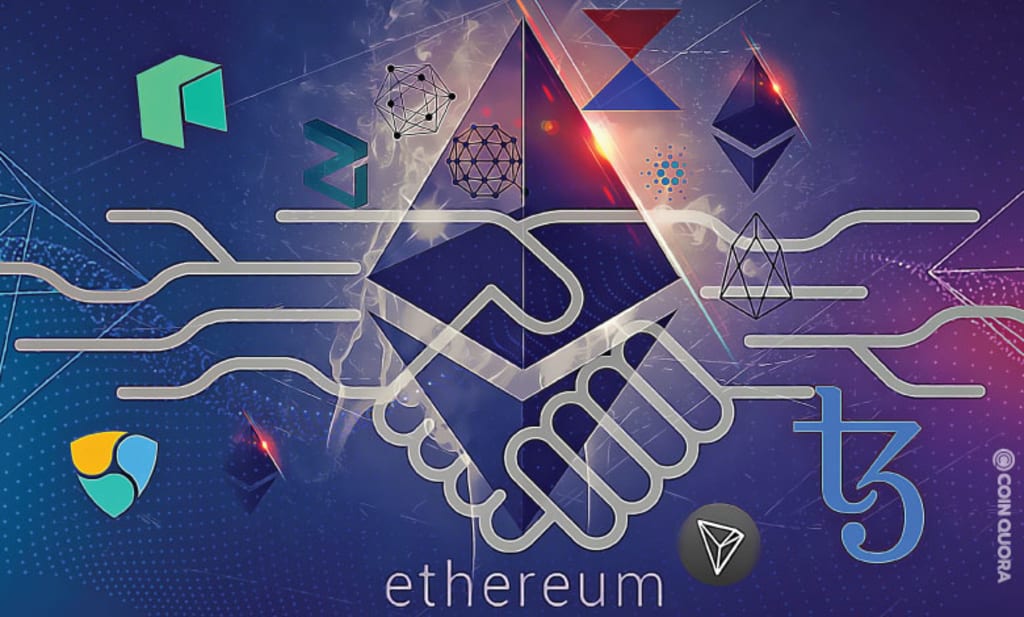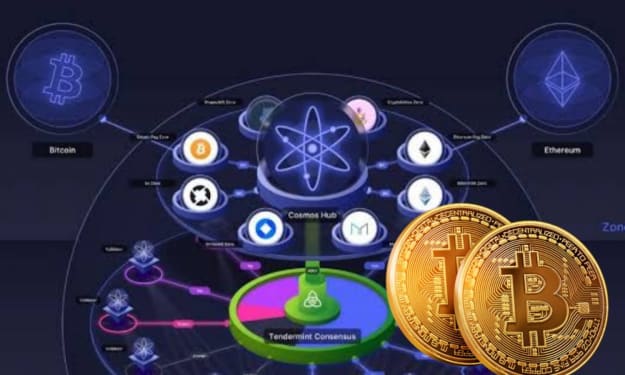
What are Ethereum and smart contracts?
In the process of understanding the blockchain , Bitcoin is always the first concept that comes into contact with, and there is another word that is often mentioned together with Bitcoin, that is Ethereum . Ethereum’s high recognition is inseparable from its core function: the construction and execution of smart contracts. Many investors in the currency circle don’t know much about this. The blockchainx will give you a brief understanding of Ethereum and Bridge Smart Contract Development Services.
(1) Comparison of Ethereum and Bitcoin

Bitcoin and Ethereum are always compared, and their similarities are:
- All successful blockchain applications
- All generate tradable digital currencies (coins) on their own systems
- Their coin consensus is high (Btc first in market value, Eth second in market value) and has investment value
But in essence, there are also big differences between the two: from the nature of its blockchain system and the mechanism of digital currency generation:
- Bitcoin is positioned as a peer-to-peer electronic cash system
- Ethereum is positioned as a decentralized application platform, which allows anyone to build and use decentralized applications running through blockchain technology in the platform.
Specifically, Bitcoin is the first mature application of blockchain technology, a commodity and investment product whose legality has not yet been agreed upon, while Ethereum is the first large-scale application of smart contract application platforms. It is ecological and can be widely used in various industries. It is an upgrade of the Internet. If Bitcoin is called Blockchain 1.0, then Ethereum is Blockchain 2.0.
Furthermore, instead of giving users a set of pre-set operations (such as Bitcoin transactions), Cross chain bridge development Ethereum is a programmable blockchain system. It includes cryptocurrencies, but is not limited to that, but can serve as a platform that allows users to create as complex operations as they wish. A simple analogy: Bitcoin is like a program with transaction functions, while Ethereum is an operating system. Using Ethereum, this system can run blockchain programs (Dapps) with various functions. These programs are mainly It is all types of smart contracts.
(2) Ethereum’s operating mechanism & smart contracts
Like all other blockchains, Ethereum requires thousands of people to run a piece of software on their personal computers to power the entire network. Each node (computer) in the network is used to run the Ethereum Virtual Machine (Ethereum Virtual Machine, EVM). Think of the EVM as an operating system that understands and executes software written in a specific programming language on Ethereum. The software or application executed by the EVM is called a “smart contract”.

A smart contract is a computer protocol designed to inform, validate or execute a contract. Smart contracts allow for trusted transactions without third parties that are traceable and irreversible. This is because once a contract is written, it cannot be edited or modified. Therefore, you can guarantee that no matter what the content of the contract is, it will be executed unconditionally. What smart contracts provide is a security that is superior to traditional contracting methods and reduces other transaction costs associated with contracts. To run smart contracts on the Ethereum system, you need to pay. However, payment is not made in conventional currencies such as USD and GBP. Instead, it uses Ethereum fuel — gas.
The official recommended programming language for smart contracts is Solidity, and the file extension ends with .sol. The Solidity language is very similar to JavaScript, and it is used to develop contracts Ethereum Virtual Machine byte code.
(3) Purpose of smart contracts
A simple example of what a smart contract can be used for: Suppose we bet on the weather tomorrow. I bet it’s sunny tomorrow, you bet it’s rainy. We agreed that the loser must give the winner $100. So how do we ensure that losers will keep their promises? There are three common ways:
1. Mutual trust
The easiest way is to trust each other. Trusting each other is easy if we have been friends for many years and know each other well. But if we were strangers, it would be troublesome and it would be difficult for us to trust each other.
2. Sign a legal agreement
Another way is to enter into relevant agreements for our bets. It details the terms of the wager, including what happens if the losing party breaches the agreement.
The agreement ensures that the loser pays the winner, but this is unrealistic because reaching an agreement through legal means is more costly than wagering.
3. Ask a mutual friend for help
We can also find a friend who trusts each other and ask the friend to keep the $100 on their behalf. $100 is paid to the winner when the answer is revealed. But what if the friend ran away with the money?
Now we have three different approaches, each with their own drawbacks. Strangers have difficulty trusting each other; legal agreements are expensive; asking mutual friends may also have trust issues.
This is where Ethereum’s smart contracts come in handy. Smart contracts are mutual friends of both parties and are written in code. Ethereum allows us to write software that lets two parties pay $100 worth of ether, check the weather the next day with a weather API, and then hand over $200 worth of ether to the winner.
(4) What is Gas
As I mentioned above, users have to pay a fee when executing a smart contract. This part of the fee will be paid to the nodes that consume memory, electricity, storage and computing, and the unit of cost is called Gas. Finally, the gas is converted into ether (ETH) according to the exchange rate.
Gas that needs to be exchanged for ETH is valuable, and when you execute a smart contract, you must define the maximum amount of gas to consume. Execution will stop when it finishes execution or when the gas value is reached. This is to avoid infinite loops in smart contracts and to prevent excessive waste of computing resources.
(5) The future of Ethereum

Needless to say, the Ethereum blockchain is the most active smart contract platform in existence. 94% of the top 100 coins by market cap were created on Ethereum. Then as long as the currency market does not collapse, the value of Ethereum will never disappear. However, although Ethereum adopts the proof-of-stake mechanism (POS mechanism) in the consensus mechanism, the transaction efficiency of the Bitcoin network has been improved, but it still cannot meet large-scale concurrency and transactions. The performance bottleneck of Ethereum is a major problem restricting its development. Secondly, the scalability, Build a cross chain bridge security and high cost of smart contracts of Ethereum are also constantly criticized. Public chain rookies such as EOS become more active after absorbing the experience of Ethereum, and gradually threaten the status of Ethereum. The upgrade road of Ethereum is not long.
Blockchain technology has been developing and improving all the time. To sum up, blockchain 1.0 is the currency, Bitcoin is the representative, blockchain 2.0 is the smart contract, and Ethereum is the representative, then the blockchain 3.0 is the blockchain application that goes beyond currency and financial markets. There will be truly high-quality blockchain applications that will come into our real life.
About the Creator
Sandyzakk
Enter and create digital economies, leveraging blockchain technology with our Metaverse development services. Design, build, and launch amazing experiences for your users effectively with a leading metaverse development company.






Comments
There are no comments for this story
Be the first to respond and start the conversation.